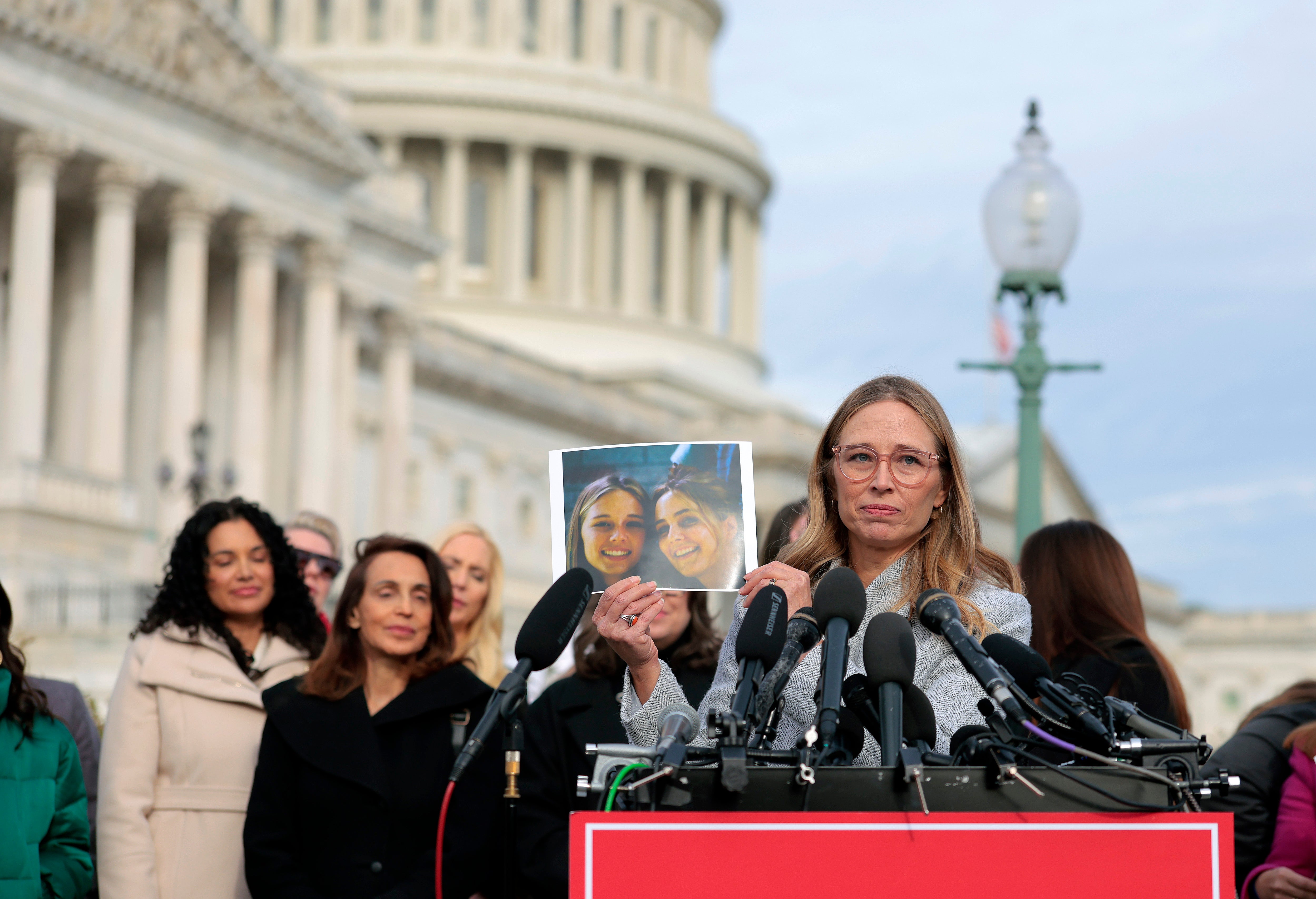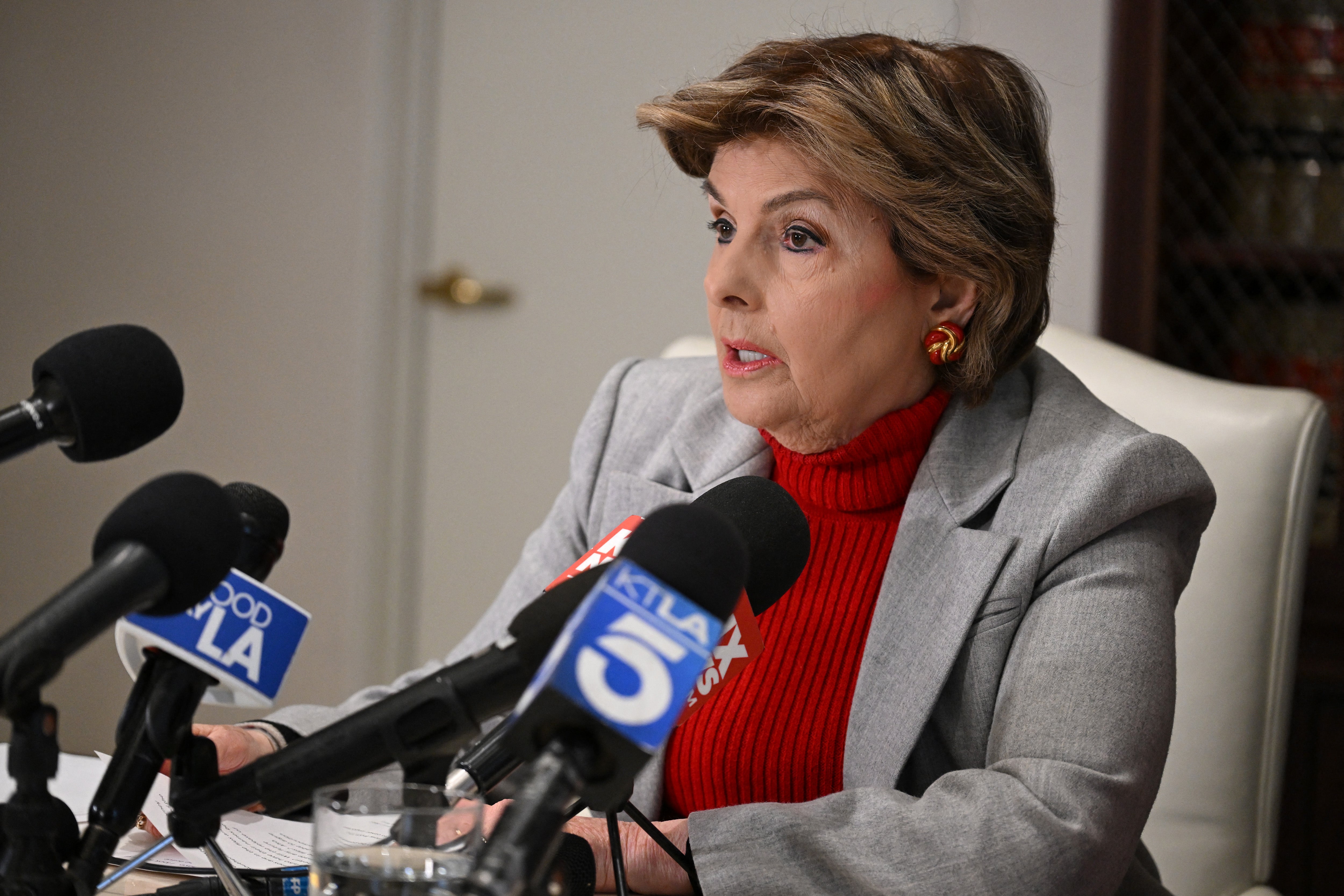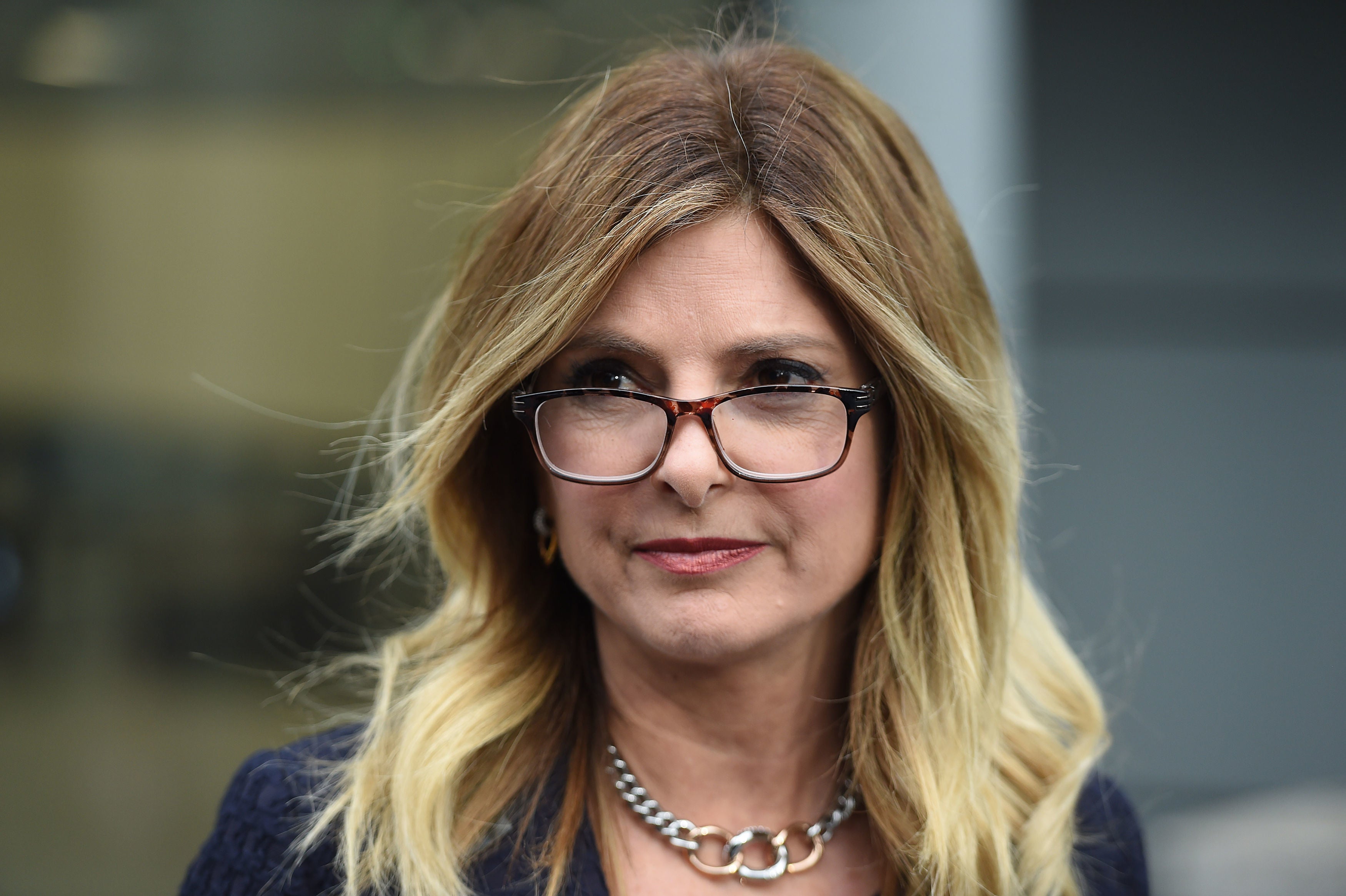Quiet, piggy.” It’s the sort of crass insult that you might hear yelled in the school playground – and certainly not what you’d expect a president to hiss at a journalist (accompanied with a finger point, no less) during a press call on Air Force One. But this disturbing incident, which saw Donald Trump berate Bloomberg reporter Catherine Lucey, is just the latest grim example of the POTUS’s well-documented woman problem.
From that Access Hollywood tape, when a pre-politics Trump notoriously alluded to “grabbing” women “by the pussy”, to his slights on “nasty woman” Hillary Clinton, to calling actor Stormy Daniels “horseface”, his history of insulting women is long and depressing. Even when he’s not going out of his way to offend, his tone can seem, well, more than a little problematic. “I just like to watch her talk,” he said in one recent press conference encounter with another female journalist, before condescendingly telling her she’d done a “good job” and addressing her as “darling”. His administration’s track record on women’s rights (or the rolling back of said rights) speaks volumes on this count, too.
How ironic, then, that it has been women who have forced his hand in what is arguably the biggest threat to his leadership so far. Earlier this month, Trump was forced to make a major U-turn when he called for Republican members of Congress to vote for the release of the Epstein files, a collection of documents relating to the sex trafficking charges against Jeffrey Epstein, who died by suicide in 2019 while awaiting trial. Previously, the president had been reluctant to do so, and even claimed that such demands were a “Democrat hoax” to “deflect” attention away from his MAGA grand plans.
Trump has so far managed to shake off scandal after scandal, but the Epstein saga appears to have seriously thrown him off kilter. The president has been photographed at parties with Epstein and his associate Ghislaine Maxwell, but has always maintained that he broke off any contact with the sex offender years before any convictions, and that he was not aware of Epstein’s wrongdoing. But for Trump’s MAGA faithful, his handling of this grim debacle, with all its false starts, about turns and prevarication, has fallen short. The president has always presented himself as a crusader against corrupt elites, his devotees believe. So why hasn’t he acted sooner to expose them?
On Tuesday, Republicans near-unanimously voted to release the files; the Senate then agreed to pass the bill. This comes after months of campaigning spearheaded by women, many of whom are unlikely political bedfellows united by a desire for the truth to come out.
Will we one day look back at them as the catalysts of Trump’s downfall? Whether the president can secure the trust of his diehard fans once again remains to be seen. In the meantime, though, these are some of the women who have played a key role in the Epstein files saga so far.
Marjorie Taylor Greene
For years, Georgia congresswoman Greene, 51, has been one of Trump’s most loyal supporters with a reputation as a true MAGA firebrand. She’s also previously embraced conspiracy theories touching on everything from Covid to QAnon to school shootings, and has been accused of racist rhetoric. But in recent months, she has undergone something of a political pivot, critiquing Trump’s foreign policy and breaking with her party to become the first Republican member of Congress to describe the crisis in Gaza as a “genocide”.
But perhaps her biggest schism with the president has been over Epstein. She was one of just four Republicans (alongside fellow MAGA stalwarts Lauren Boebert and Nancy Mace, and Kentucky representative Thomas Massie) to sign the petition calling for the release of the files. Her very public stance on this issue has prompted Trump to lash out in characteristically splenetic fashion, branding her "Marjorie ‘Traitor’ Greene” and, somewhat improbably, accusing her of becoming “Far Left”.
Greene and her family have since been the subject of threats, she has claimed. “As a woman, I take threats from men seriously,” she said. “I now have a small understanding of the fear and pressure the women, who are victims of Jeffrey Epstein and his cabal, must feel.” She’s even had something of a mea culpa moment, “humbly” apologizing “for taking part in the toxic politics” after a CNN interviewer pointed out that she’d never previously spoken out about the potential impact of Trump’s verbal attacks.
Annie Farmer

All the way back in 1996, 16-year-old Annie Farmer and her older sister Maria, then 25, made the first known reports to the FBI and NYPD about Epstein’s abuse. It would take almost a decade for investigators to actually start probing the murky world of the financier and his associates. Despite this, the Farmer sisters have spent almost three decades fighting for their stories to be heard, and to achieve some semblance of justice.
In 2019, Annie spoke at a bail hearing for Epstein, and two years later, she was one of four women who testified against his associate, Maxwell, who is currently serving a 20-year sentence for sex trafficking. She was the only accuser to waive her anonymity, with the other women using pseudonyms.
Since then, she’s been a key voice in pushing for the Epstein files to be released, and has warned against politicising the issue. Speaking outside the Capitol this week, where she held up a photo of her and her sister in the Nineties, she pointed out that this harrowing saga has played out over the course of various presidencies, Democratic and Republican.
And while headlines about the Epstein files often end up fixating on the powerful men in the sex offender’s orbit, her words are an important reminder that it’s the victims who should be at the centre of this awful story. “There are people who have used this to their advantage and tried to focus on elements of it that are sensational,” she told the BBC. “These victims are people with feelings that are trying to live their everyday lives, and this can feel like a real weight falling on us.”
Gloria Allred

At 84, Allred’s five-decade-long legal career seems to show no signs of slowing down. Probably one of the best-known attorneys in the United States, she has spent the majority of her working life taking on sexual harassment, workplace discrimination and women’s rights-related cases. Her fame, though, is largely down to the fact that she has represented a whole host of clients against famous men, from Roman Polanski to OJ Simpson to Trump himself.
It’s a track record that has earned her a reputation either as a sort of avenging angel of women’s rights, or as an “ambulance chaser of feminism” who loves the spotlight, as one detractor once branded her in The Atlantic. But her profile has only risen in the aftermath of #MeToo. She has represented accusers in cases against Bill Cosby, R. Kelly, Harvey Weinstein and, more recently, Sean “Diddy” Combs.
And she has also worked with 27 Epstein victims; most recently, she has posted a press conference with accuser Alicia Arden, who claims Epstein groped her in a Santa Monica hotel in 1997. Allred has repeatedly urged Andrew Mountbatten-Windsor to cooperate with investigators probing his links to Epstein (Mountbatten-Windsor has always strongly denied any wrongdoing) and has used her considerable platform to keep the victims’ stories in the public conversation. “Many people would prefer it if women were silenced, if women were second-class citizens and didn’t fight back,” she told The Times in 2018. “I’m not one of those people.”
Lisa Bloom

Representing 11 further Epstein victims is 64-year-old Bloom, Allred’s daughter, who has inherited her mother’s zeal for women’s rights. She’s spent most of her 30 or so years in law taking on sexual abuse and harassment cases, and her client list is just as high profile as her mother’s: she represented the model Janice Dickinson against Bill Cosby, The OC actor Mischa Barton in a revenge porn case, and the employees who accused Fox News host Bill O’Reilly of harassment.
A blot on her record, though, is her stint working as a legal adviser to Harvey Weinstein, shortly after initial allegations of abuse emerged against the producer, whom she characterised merely as “an old dinosaur learning new ways”. A few days after the New York Times published its bombshell exposé on Weinstein in October 2017, Bloom parted ways with him. She has since referred to the job as “a colossal mistake”. “I feel deeply embarrassed that I was ever associated with him, that I allowed myself to be fooled and to be in his orbit,” she told The Independent in 2022.
Bloom has been working with Epstein survivors since 2019. Like her mother, she has a major media profile and has used it to keep the pressure on Epstein’s alleged “enablers”, urging the other figures in his circle to come forward with information. A prominent voice calling for the files to be released, she has criticised how the case has been used as a “political football”. “All [the victims] have ever wanted was accountability and transparency,” she recently told CNN. “Release the files, redact the names of the survivors and let’s have accountability for everybody who was involved with this predator.”
Marina Lacerda

Until just two months ago, Marina Lacerda was identified only as “Minor-Victim 1” in the 2019 court case against Epstein. As a key witness in the indictment, she told of how she was recruited back in 2002, at the age of just 14, to massage him at his New York townhouse. At the time, she was working multiple jobs to support her family, who had moved to the city from Brazil, and thought it would be a simple way to make money. But this apparent “dream job” quickly became “the worst nightmare”, with Lacerda suffering three years of abuse, until Epstein decided she was “too old” at 17.
In September, Lacerda bravely chose to waive her anonymity for the first time and spoke about her experiences outside Capitol Hill in Washington D.C. alongside other victims, in a bid to urge lawmakers to release the Epstein files. Earlier this week, ahead of the House vote, she suggested that Trump’s insistence that the files were “a hoax” only “empowered us and now you’ve made people listen to us even more”. Releasing them entirely, she has said, will help her “put the pieces of my own life back together”.
Bad news for Trump $2,000 checks as Senators balk at price tag
Trump claims conspiracy over daughter Tiffany’s Covid-canceled Georgetown graduation
All eyes on Nvidia earnings in wait for results on AI boom or bubble
Maryland county lifts its nearly 30-year ban on Pit Bulls
Zohran Mamdani to keep Adams-appointed NYPD Commissioner Jessica Tisch
White House officials say Trump is plotting retribution after Epstein bill vote







